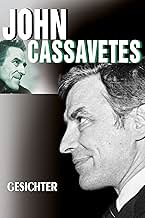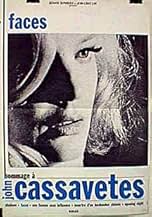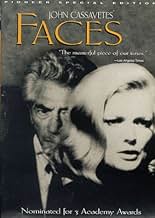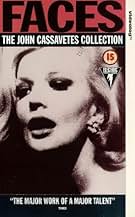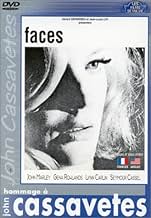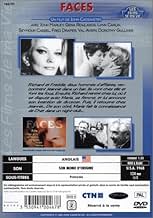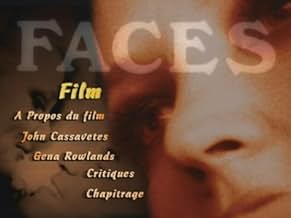AVALIAÇÃO DA IMDb
7,4/10
12 mil
SUA AVALIAÇÃO
Um homem de meia-idade deixa a sua esposa por outra mulher. Pouco tempo depois, a sua ex-mulher também começa uma relação com um casal mais jovem. Segue as suas lutas para encontrar amor uns... Ler tudoUm homem de meia-idade deixa a sua esposa por outra mulher. Pouco tempo depois, a sua ex-mulher também começa uma relação com um casal mais jovem. Segue as suas lutas para encontrar amor uns pelos outros.Um homem de meia-idade deixa a sua esposa por outra mulher. Pouco tempo depois, a sua ex-mulher também começa uma relação com um casal mais jovem. Segue as suas lutas para encontrar amor uns pelos outros.
- Indicado a 3 Oscars
- 5 vitórias e 9 indicações no total
George Dunn
- Comedian
- (as George Dunne)
Avaliações em destaque
10djb8
This movie is the epitome of brilliantly dramatic character study: It's so phenomenal, watching it is excruciating. Cassavetes takes us deep inside the lives of a bored, shallow upper-middle-class couple, and as his skilled actors improvise remarkably realistic scenes, down to the smallest mannerism of their characters, Cassavetes forces us to watch every knife-twisting second. It's difficult: Rather than watching an unpleasant situation, then getting pulled away by an editor's cut, we have to sit through all 20 or 25 minutes of a scene that makes us squirm, whether it's a middle-aged man making an ass of himself to impress a young prostitute or his wife feigning laughter to make a young man think she's having fun with him. While not the best movie I've ever seen, it's unique: A great work to whose style nothing else compares.
I see movies hoping that they're different. I've seen so many films that were exactly the same and that's really just a waste of time. Well, Faces is certainly different. It's hard to get through. It actually took me a week. That's because there is little action and it is hard to get interested in it. The reason why it's so original is because it is practcially a documentary on social life in this time period. It's as low budget as you get. Characters just hang around houses drinking and enjoying themselves. So I guess there isn't much of a plot, but on the good side this might be the most realistic movie I've ever seen. I really felt like nothing was unrealistic, not even a single one of the conversations. That's different. Most movies try to impress, but Faces tries to be natural. That doesn't make much sense because "natural" means you're not trying to do anything, you're just existing as you always do. Maybe that was how Faces was filmed. It definately feels natural and that's a big achievment.
So this is the work of John Cassavetes? Pretty good, I must say. I definitely can appreciate good conversations and witty dialogue any day.
This film, I would say is another one of those indie films (sort of foreign-filmmaking- esque) from how it is much ado about NOTHING. I love these films. They are like a breath of fresh air. That, and they always seem so personal. I wonder if it was actually scripted or if it was improvised like most Cassavetes projects.
The only work I have seen of Mr. John Cassavetes was his depute film, Shadows, which was mainly all improve, or so he says in his interviews. I take a strong liking to these films because of how slow they are, yet SO INVITING; so UN-American, if you will. - People have said that Cassavetes brought the indie film movement to the states. So far I have not been proved wrong so far. His films, such as Faces, are all so unique and timeless. Like literally, I believe this movie will be studied until THE END OF TIME.
I like seeing people celebrating. It is nice. Gives one the feeling of calmness; like nothing extreme is happening so we don't have to waste any time stressing about it. Does that make sense?
Our main protagonist, Richard Forst (played by John Marley), is a (so called) businessman who has an affair with a much younger woman. Little does he know that his wife has some plans of her own.. You can really tell what kind of man Robert is when he says:
"I'm just a mild success in a dull profession, and I want to start over again. And I've got a bad kidney!"
This just shows what kind of person he is as he says it to the younger girl, Jeannie (played by the beautiful Gene Rowlands).
I really like the acting and love the struggles and conflict that this husband and wife go through. Both are trying to find happiness in so many ways, but is only making it worse for themselves. .
-- Michael Mendez
This film, I would say is another one of those indie films (sort of foreign-filmmaking- esque) from how it is much ado about NOTHING. I love these films. They are like a breath of fresh air. That, and they always seem so personal. I wonder if it was actually scripted or if it was improvised like most Cassavetes projects.
The only work I have seen of Mr. John Cassavetes was his depute film, Shadows, which was mainly all improve, or so he says in his interviews. I take a strong liking to these films because of how slow they are, yet SO INVITING; so UN-American, if you will. - People have said that Cassavetes brought the indie film movement to the states. So far I have not been proved wrong so far. His films, such as Faces, are all so unique and timeless. Like literally, I believe this movie will be studied until THE END OF TIME.
I like seeing people celebrating. It is nice. Gives one the feeling of calmness; like nothing extreme is happening so we don't have to waste any time stressing about it. Does that make sense?
Our main protagonist, Richard Forst (played by John Marley), is a (so called) businessman who has an affair with a much younger woman. Little does he know that his wife has some plans of her own.. You can really tell what kind of man Robert is when he says:
"I'm just a mild success in a dull profession, and I want to start over again. And I've got a bad kidney!"
This just shows what kind of person he is as he says it to the younger girl, Jeannie (played by the beautiful Gene Rowlands).
I really like the acting and love the struggles and conflict that this husband and wife go through. Both are trying to find happiness in so many ways, but is only making it worse for themselves. .
-- Michael Mendez
10Dr.Mike
Faces is one of the first American films to reach to the >core of people's relationships. It provides wonderful insight into a lifestyle that is distinctly American. The detached way that the characters interact most of the time is only a logical conclusion of the commerce-driven world we live in. The film is personal in a way that many European films of the 1950's and 1960's were. Even the title suggests the intimacy of the film and its treatment of its characters.
Cassavettes must have been repulsed by the insincerity of the people who were surrounding him when he wrote Faces. Few films have so many moments where characters are together but not talking to each other. They are merely talking, or laughing, or singing, doing anything they can to avoid having to confront the other person. Only once, when the young lover boy talks about the mechanical nature of people in America, do we even get any hint that the filmmaker is put off by the behavior of his characters. The rest of the time he merely films them and shows us what they do. This unsentimental approach can leave the viewer feeling a bit odd, but it works very well in the end. By seeing these character's shortcomings without any hint of disapproval from the filmmaker, the viewer is forced to consider their own lives and the people around them. It allows for an honesty not found in any, I repeat ANY other American film of the 1960's. Even Who's Afraid of Virginia Woolf has some indications of Nichols' attitude towards the material. Faces is just the facts.
I can only imagine the excitement that people interested in film must have felt upon the release of this film. Here was a personal, Bergman-esque film made about American people living American lives. (Note: Bergman is referenced during the film.) The quiet desperation of the housewife, the empty feeling inside the businessman, the false nature of each and every relationship speak volumes about the reality of American family life. How refreshing it must have been to see these topics approached in an American film.
The film's style is notable as well. It is independent in every sense of the word. It uses a fluid camera, freeform acting, and natural lighting. In many ways, it paved the way for a lot of the young filmmakers of the 1970's by providing them with a stylistic freedom that Hollywood had previously ignored. Today, it appears as a fairly standard film in terms of style, but at the time it was groundbreaking and exciting. In fact, it retains that excitement today, although the real revelation is how much has been taken from the film and used by others.
Faces is a great movie experience. Anyone frustrated with the lack of real connection in their lives should see it, if only to realize that many others are suffering from the same fate.
Cassavettes must have been repulsed by the insincerity of the people who were surrounding him when he wrote Faces. Few films have so many moments where characters are together but not talking to each other. They are merely talking, or laughing, or singing, doing anything they can to avoid having to confront the other person. Only once, when the young lover boy talks about the mechanical nature of people in America, do we even get any hint that the filmmaker is put off by the behavior of his characters. The rest of the time he merely films them and shows us what they do. This unsentimental approach can leave the viewer feeling a bit odd, but it works very well in the end. By seeing these character's shortcomings without any hint of disapproval from the filmmaker, the viewer is forced to consider their own lives and the people around them. It allows for an honesty not found in any, I repeat ANY other American film of the 1960's. Even Who's Afraid of Virginia Woolf has some indications of Nichols' attitude towards the material. Faces is just the facts.
I can only imagine the excitement that people interested in film must have felt upon the release of this film. Here was a personal, Bergman-esque film made about American people living American lives. (Note: Bergman is referenced during the film.) The quiet desperation of the housewife, the empty feeling inside the businessman, the false nature of each and every relationship speak volumes about the reality of American family life. How refreshing it must have been to see these topics approached in an American film.
The film's style is notable as well. It is independent in every sense of the word. It uses a fluid camera, freeform acting, and natural lighting. In many ways, it paved the way for a lot of the young filmmakers of the 1970's by providing them with a stylistic freedom that Hollywood had previously ignored. Today, it appears as a fairly standard film in terms of style, but at the time it was groundbreaking and exciting. In fact, it retains that excitement today, although the real revelation is how much has been taken from the film and used by others.
Faces is a great movie experience. Anyone frustrated with the lack of real connection in their lives should see it, if only to realize that many others are suffering from the same fate.
When I began watching Faces, I realized that I never knew just when the present scene was going to end. I then realized that I wished that it would last forever. I found myself so engrossed in the scene that I was fascinated with it by itself. Then the next scene began, and the next scene, and within each one, there is a whole single movie with characters and a story arch. Faces is a film that does not allow any given scene to simply be a communication of plot information. Cassavetes created an entire universe for his actors in every scene. Each scene is a million years of passion spliced together, each demonstrating brazenly his brilliant recognition of human exchange and in conversation and conflict what is exchanged and what is left to be desired.
The film has moments of great pain because miniature struggles are so real and they tend to be vocalizations of a person's deeper fears in social interactions and in the structure of life. The film has scenes of furious drama because characters will experience blind unleashing of their ids as middle-aged people. Faces also delivers highly during moments of happiness and fun because, the situation's comfort level gracefully allowing, the characters will show the fieriest, grandiose, extroverted parts of themselves.
The movie's message, ironically, is not about the inner self and the unleashing of it but about the naiveté with which people carry out their normal married lives and don't care to face their flaws and problems and, though they gradually strip their personalities down bare throughout interactions, they continue not knowing themselves or each other. Faces is now among my favorite films of all time and places John Cassavetes on a pedestal as an idol of mine. The movie is a supreme demonstration of powerhouse acting, wherein each performance can be cherished by the performer with a feeling of ownership. There is a bit of real actor in each character played, and that can be seen in each and every powerhouse scene in a row.
The film has moments of great pain because miniature struggles are so real and they tend to be vocalizations of a person's deeper fears in social interactions and in the structure of life. The film has scenes of furious drama because characters will experience blind unleashing of their ids as middle-aged people. Faces also delivers highly during moments of happiness and fun because, the situation's comfort level gracefully allowing, the characters will show the fieriest, grandiose, extroverted parts of themselves.
The movie's message, ironically, is not about the inner self and the unleashing of it but about the naiveté with which people carry out their normal married lives and don't care to face their flaws and problems and, though they gradually strip their personalities down bare throughout interactions, they continue not knowing themselves or each other. Faces is now among my favorite films of all time and places John Cassavetes on a pedestal as an idol of mine. The movie is a supreme demonstration of powerhouse acting, wherein each performance can be cherished by the performer with a feeling of ownership. There is a bit of real actor in each character played, and that can be seen in each and every powerhouse scene in a row.
Você sabia?
- CuriosidadesWhile filming a part on Bob Hope Presents the Chrysler Theatre (1963), John Cassavetes saw Steven Spielberg lurking around the set, as he was then in the habit of doing. Cassavetes approached Spielberg and asked what he wanted to be. When Spielberg replied he wanted to be a director, Cassavetes allowed the young man to direct him for the day. He later invited Spielberg to work on this film with Spielberg serving as an uncredited production assistant on Faces (1968) for two weeks.
- Citações
Maria Forst: There's a Bergman film in the neighborhood.
Richard Forst: I don't feel like getting depressed tonight.
- ConexõesFeatured in Cinéastes de notre temps: John Cassavetes (1969)
- Trilhas sonorasLove Is All You Really Want
Written by Jack Ackerman
Principais escolhas
Faça login para avaliar e ver a lista de recomendações personalizadas
- How long is Faces?Fornecido pela Alexa
Detalhes
Bilheteria
- Orçamento
- US$ 275.000 (estimativa)
- Faturamento bruto mundial
- US$ 7.236
- Tempo de duração2 horas 10 minutos
- Cor
- Mixagem de som
- Proporção
- 1.66 : 1
Contribua para esta página
Sugerir uma alteração ou adicionar conteúdo ausente



